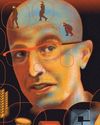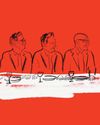
“When I started it, they all just called it that crap. Like, ‘Oh, they’re over there doing that crap.’ ” This nurse, whom I’ll call Jamie, was on the line from a Veterans Affairs medical center in the Northeast. She’d been struggling for a few minutes between the impulse to tout the program she’d piloted, which offers Reiki to vets as part of their medical care, and the impulse to “tread lightly,” because some of the doctors, nurses, and administrators she works with still think that Reiki is quackery or—you know.
Reiki, a healing practice codified in the early 20th century in Japan, was until recently an unexpected offering for a VA medical center. In Japanese, rei roughly translates to “spiritual”; ki is commonly translated as “vital energy.” A session often looks more like mysticism than medicine: Healers silently place their hands on or over a person’s body to evoke a “universal life force.” A Reiki treatment can even, practitioners believe, be conducted from miles away.
Reiki’s growing popularity in the U.S.—and its acceptance at some of the most respected American hospitals—has placed it at the nexus of large, uneasy shifts in American attitudes toward our own health care. Various non-Western practices have become popular complements to conventional medicine in the past few decades, chief among them yoga, meditation, and acupuncture, all of which have been the subject of rigorous scientific studies that have established and explained their effectiveness. Reiki is the latest entrant into the suite of common additional treatments. Its presence is particularly vexing to naysayers because Reiki delivers demonstrable salutary effects without a proven cause.
This story is from the {{IssueName}} edition of {{MagazineName}}.
Start your 7-day Magzter GOLD free trial to access thousands of curated premium stories, and 9,000+ magazines and newspapers.
Already a subscriber ? Sign In
This story is from the {{IssueName}} edition of {{MagazineName}}.
Start your 7-day Magzter GOLD free trial to access thousands of curated premium stories, and 9,000+ magazines and newspapers.
Already a subscriber? Sign In

A Brief History of Yuval Noah Harari - How the scholar became Silicon Valley's favorite guru
"About 14 billion years ago, matter, energy, time and space came into being." So begins Sapiens: A Brief History of Humankind (2011), by the Israeli historian Yuval Noah Harari, and so began one of the 21st century's most astonishing academic careers. Sapiens has sold more than 25 million copies in various languages. Since then, Harari has published several other books, which have also sold millions. He now employs some 15 people to organize his affairs and promote his ideas.

Boat Fish Don't Count
The wild, obsessive, dangerous pursuit of Montauk's biggest striped bass

The Anti-Rock Star
Leonard Cohen's battle against shameless male egoism

Rachel Kushner's Surprising Swerve
She and her narrators have always relied on swagger-but not this time.

Men on Trips Eating Food
Why TV is full of late-career Hollywood guys at restaurants

You Think You're So Heterodox
Joe Rogan has turned Austin into a haven for manosphere influencers, just-asking-questions tech bros, and other \"free thinkers\" who happen to all think alike.

What Abortion Bans Do to Doctors
In Idaho and other states, draconian laws are forcing physicians to ignore their training and put patients' lives at risk.

THE LOYALIST KASH PATEL WILL DO EXACTLY WHAT TRUMP WANTS.
A 40-year-old lawyer with little government experience, he joined the administration in 2019 and rose rapidly. Each new title set off new alarms.

THE RADICAL CONVERSION OF MIKE LEE
IN 2016, HE TRIED TO STOP TRUMP FROM BECOMING PRESIDENT. BY 2020, HE WAS TRYING TO HELP TRUMP OVERTURN THE ELECTION. NOW HE COULD BECOME TRUMP'S ATTORNEY GENERAL.

HYPOCRISY, SPINELESSNESS, AND THE TRIUMPH OF DONALD TRUMP
He said Republican politicians would be easy to break. He was right.